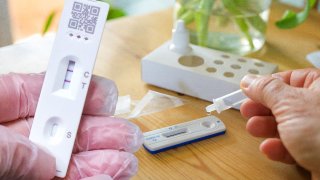
For some people, COVID-19 symptoms may only last a few days. But that's not the same for everyone, as symptoms could go on for weeks or potentially linger for months.
With case numbers rising yet again, some may be wondering if those cold-like or allergy symptoms they're experiencing are actually COVID. Furthermore, with the presence of new variants such as BA.5 and BA.2.75, could symptoms be lasting longer than before?
According to the CDC, COVID symptoms can appear anywhere from two to 14 days after someone is exposed to the virus. The agency says most people with COVID-19 "get better within a few days to a few weeks after infection."
Under current guidelines, people who contract COVID are advised to isolate for five days, followed by an additional five days of strict mask use. After that, the risk of spreading the disease drops "significantly," according to Dr. Allison Arwady, commissioner of the Chicago Department of Public Health.
Feeling out of the loop? We'll catch you up on the Chicago news you need to know. Sign up for the weekly Chicago Catch-Up newsletter here.
However, you won't want to let your guard down just yet. It's possible people are staying positive longer due to the ultra-contagious BA.5 omicron subvariant.
"I wouldn't say the incubation period is shorter... it's been getting shorter compared to what the original was, but we are seeing people often have just upper respiratory symptoms or having a cold, they're having sore throat sometimes, they're having fever or not seeing a lot of that severe illness - especially in people who are up to date with vaccine because the secondary part of your immune system kicks in and helps - but we're seeing people...they can stay positive for a little longer," Dr. Allison Arwady, the commissioner of the Chicago Department of Public Health, said during a previous Facebook live question-and-answer session.
Generally speaking, even 10 days post-COVID, some symptoms may be present. Typically, they're no longer concerning.
Local
"...If you're mostly feeling well, especially if what is still kind of lingering is a cough or a little bit of cough tends to be the last thing to go away after any virus, It is unlikely that you are still spreading disease," Arwady explained.
Doctors warn that people can still test positive months after contracting COVID-19, especially when using a PCR test.
If you're still worried about possibly spreading the disease, getting tested again may provide some peace of mind. If you're not feeling well, still make sure to wear a mask, Arwady said. However, if you take a test and the results are negative, you're "very unlikely" to be contagious.
For those who continue to experience symptoms weeks post infection, long COVID is a possibility. Defined as long-term effects following an infection, long COVID symptoms can range from a wide variety of ailments, some of which may even disappear and then return later.
The conditions, which include brain fog, headaches and blurred vision, can last for weeks, months or even possibly years.
"Post-COVID conditions may not affect everyone the same way. People with post-COVID conditions may experience health problems from different types and combinations of symptoms happening over different lengths of time," the CDC reports. "Most patients’ symptoms slowly improve with time. However, for some people, post-COVID conditions may last months, and potentially years, after COVID-19 illness and may sometimes result in disability."



